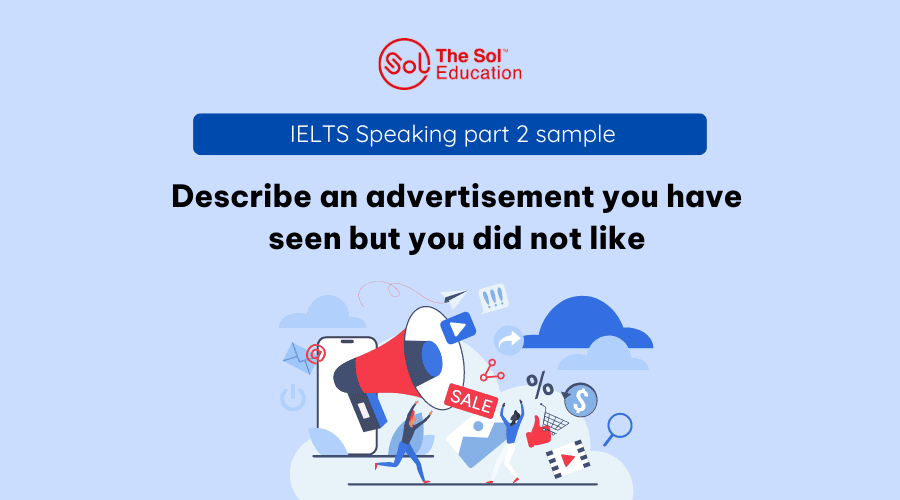Quảng cáo xuất hiện rất nhiều trong cuộc sống của chúng ta. Và có lẽ sẽ có những quảng cáo khiến bạn không thích đúng không nào! Trong bài viết này, các bạn hãy cùng SOL IELTS giải quyết đề bài IELTS Speaking part 2 Describe an advertisement you have seen but you did not like và trả lời các câu hỏi IELTS Speaking part 3 liên quan đến topic này nhé.

Tham khảo:
Describe an advertisement you have seen but you did not like
You should say:
I remember seeing an advertisement about two months ago when I was scrolling through my social media feed on Facebook. It was during my evening break, around 7 PM. This ad popped up unexpectedly while I was catching up on the latest posts from my friends and some news updates.
The advertisement was for a weight loss product, specifically a type of diet pill that promised quick and effortless weight loss within a short period. The brand claimed that by taking these pills, users could lose up to 10 kilograms in a month without any need for exercise or dietary changes.
In the advertisement, there were several before-and-after photos of people who allegedly used the product. The "before" pictures showed individuals who appeared overweight, while the "after" photos depicted the same individuals looking significantly slimmer. The ad also included some text with bold claims about the effectiveness of the product, stating that it was scientifically proven and safe. Additionally, there was a short video clip showing a person taking the pill and then magically transforming into a much thinner version of themselves within seconds.
I did not like this advertisement for several reasons. Firstly, it seemed to promote unrealistic and unhealthy expectations about weight loss. The idea that one can lose a significant amount of weight without any lifestyle changes is not only misleading but also potentially dangerous. Secondly, the use of before-and-after photos and video effects felt very deceptive. It was clear to me that these images were likely edited or staged to exaggerate the results. Lastly, I found the ad to be quite manipulative, as it preyed on people's insecurities about their body image and offered a quick fix instead of encouraging healthy habits. Overall, the advertisement struck me as dishonest and unethical, which is why it left a very negative impression on me.
Từ vựng IELTS hữu ích:
Unexpectedly /ʌnɪkˈspɛktɪdli/ (Adv.): đột ngột, bất ngờ.
Effortless /ˈɛfərtlɪs/ (Adj.): không cần nỗ lực, không mất công sức.
Dietary changes /ˈdaɪəˌtɛri ˈʧeɪndʒɪz/ (N. phr.): thay đổi chế độ dinh dưỡng.
Allegedly /əˈlɛdʒɪdli/ (Adv.): theo lời tuyên bố, được cho là.
Exaggerate /ɪɡˈzædʒəreɪt/ (V.): phóng đại, cường điệu.
Manipulative /məˈnɪpjʊlətɪv/ (Adj.): gian lận, lừa đảo.
Insecurities /ɪnˈsɪkjʊrətiz/ (N.): sự tự ti, sự không an tâm.
Quick fix /kwɪk fɪks/ (N. phr.): giải pháp tạm thời, giải pháp nhanh chóng.
Misleading /mɪsˈliːdɪŋ/ (Adj.): gây hiểu lầm, lừa dối.
Deceptive /dɪˈsɛptɪv/ (Adj.): lừa dối, gian lận.
Exaggerate /ɪɡˈzædʒəreɪt/ (V.): phóng đại, cường điệu.
Unethical /ʌnˈɛθɪkəl/ (Adj.): không đạo đức, không đúng đắn.
I recall stumbling upon an advertisement for instant noodles about a month ago while I was browsing through YouTube videos late one evening. It was an unexpected interruption during my leisure time, around 9 PM.
The advertisement was for a brand of instant noodles that claimed to be the healthiest option available on the market. It emphasized the convenience of their product, highlighting its quick preparation time and affordable price. The visuals showcased a steaming bowl of noodles adorned with fresh vegetables and herbs, accompanied by upbeat music and enticing animations.
What I found unsettling about this advertisement was its misleading portrayal of the product's nutritional value. Despite the vibrant depiction of vegetables and herbs, a closer look at the packaging revealed high levels of sodium and artificial additives. The ad failed to mention these aspects, instead focusing solely on the visual appeal and convenience of the noodles.
As someone who values transparency and honesty in advertising, I was disappointed by the deceptive tactics employed to promote this product. It seemed unethical to prioritize sales over the well-being of consumers by masking the unhealthy ingredients present in the noodles. This advertisement left me feeling skeptical about the integrity of the brand and wary of similar marketing strategies used within the food industry.
Từ vựng IELTS hữu ích:
Stumbling upon /ˈstʌmbəlɪŋ əˈpɒn/ (V. phr.): tình cờ gặp, lạc vào.
Interruption /ˌɪntəˈrʌpʃən/ (N.): sự gián đoạn, sự làm gián đoạn.
Convenience /kənˈviːniəns/ (N.): sự tiện lợi, sự thuận tiện.
Adorned /əˈdɔːrnd/ (V.): trang trí, làm đẹp thêm.
Unsettling /ʌnˈsɛtlɪŋ/ (Adj.): làm bất an, làm bối rối.
Misleading portrayal /mɪsˈliːdɪŋ pɔːrˈtreɪəl/ (N. phr.): sự mô tả sai lệch, không chính xác.
Nutritional value /njuˈtrɪʃənl ˈvæljuː/ (N. phr.): giá trị dinh dưỡng.
Sodium /ˈsəʊdiəm/ (N.): natri, muối.
Artificial additives /ɑːtɪˈfɪʃəl ˈædɪtɪvz/ (N. phr.): chất phụ gia nhân tạo.
Transparency /trænˈspærənsi/ (N.): sự minh bạch, sự rõ ràng.
Deceptive tactics /dɪˈsɛptɪv ˈtæktɪks/ (N. phr.): chiến thuật gian lận, mánh khóe lừa dối.
Prioritize /praɪˈɒrɪtaɪz/ (V.): ưu tiên, ưu ái.
Well-being /wɛlˈbiːɪŋ/ (N.): sự khỏe mạnh, sự an lạc.
Integrity /ɪnˈtɛɡrɪti/ (N.): tính chính trực, tính trung thực.
Social media plays a crucial role in modern advertising. It provides a platform where businesses can reach a large and diverse audience with targeted ads. Through social media, companies can engage with potential customers in a more interactive and personalized manner. Algorithms on platforms like Facebook, Instagram, and Twitter allow advertisers to tailor their messages based on users' interests, behaviors, and demographics, making campaigns more effective. Additionally, social media facilitates immediate feedback and engagement, enabling businesses to adapt their strategies in real-time and build stronger relationships with their audience.
Yes, advertising often encourages us to buy things we don’t need. Advertisers use various psychological tactics to create a perceived need or desire for their products. They appeal to our emotions, such as the desire for status, happiness, or beauty, and suggest that their product can fulfill these needs. Additionally, advertising can create a sense of urgency through limited-time offers or exclusive deals, making us feel compelled to make impulsive purchases. While advertising is a valuable tool for informing consumers about products, it can also lead to overconsumption and impulse buying.
Celebrity endorsements can be very effective in advertising. Celebrities have a wide-reaching influence and can lend credibility and attractiveness to a product. When consumers see a well-known and respected figure using a product, they are more likely to trust and want to buy it. However, the effectiveness of celebrity endorsements also depends on the perceived authenticity and relevance of the celebrity to the product. If the endorsement seems insincere or mismatched, it can backfire and damage both the brand and the celebrity's reputation. Overall, when done right, celebrity endorsements can significantly boost brand recognition and sales.
Advertising offers numerous benefits. Firstly, it helps businesses reach a wider audience and increase their sales. Through advertising, companies can inform potential customers about their products and services, leading to higher brand awareness and customer acquisition. Secondly, advertising can stimulate economic growth by encouraging consumer spending and competition among businesses. It also supports media and entertainment industries by providing a primary source of revenue. Lastly, from a consumer perspective, advertising provides information about available products and services, helping them make informed purchasing decisions.
Online advertising is generally more effective than newspaper advertising in today’s digital age. Online ads offer better targeting options, allowing businesses to reach specific demographics based on interests, location, and behavior. They also provide real-time data and analytics, enabling advertisers to measure the effectiveness of their campaigns and make adjustments quickly. Additionally, online advertising often costs less and can reach a global audience, whereas newspaper advertising is limited to the publication’s circulation area. However, newspaper ads can still be effective for reaching certain demographics, particularly older audiences who may prefer traditional media.
In Vietnam, the most advertised products tend to be consumer goods, including food and beverages, personal care products, and household items. Brands like Vinamilk, Coca-Cola, and Unilever frequently run advertisements for their milk, soft drinks, and personal hygiene products. Additionally, telecommunications services from companies like Viettel and Mobifone are heavily advertised, promoting mobile plans and internet services. Another highly advertised sector is the technology market, with brands like Samsung and Apple frequently promoting their latest smartphones and gadgets. These advertisements are omnipresent, appearing on TV, online platforms, and billboards across the country.
Hy vọng bài viết đã cung cấp cho các bạn những từ vựng và ý tưởng hay để trả lời cho câu hỏi speaking part 2 Describe an advertisement you have seen but you did not like.
Chúc các bạn học tốt nhé.
